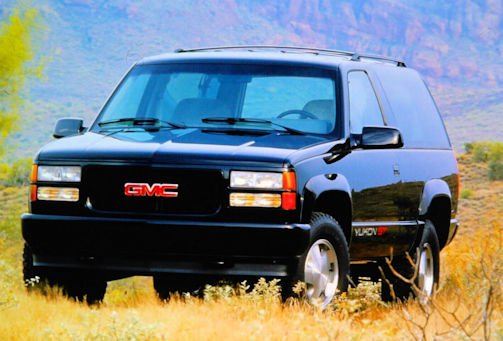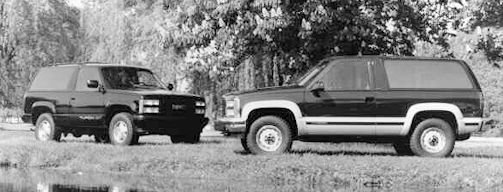GMC Yukon First Generation
 |
|
|
Production period: |
1992 to 1999 |
|
Body versions : |
station wagon |
|
Engines: |
Gasoline :5.7 liters (190 kW),6.5-Liter Turbo- Diesel V8 |
|
Length: |
4788-5075 mm |
|
Width: |
1941-1958 mm |
|
Height: |
1839-1941 mm |
|
Wheelbase : |
2832-2985 mm |
|
Curb weight : |
2066 kg |
The GMC Yukon is a sport utility vehicle of the American automobile manufacturer GMC.
History
The first generation of the Yukon on the GMT-400 chassis came in 1992 as a replacement for the GMC Jimmy K5 on the market. Like its predecessor, it was available as a three-door Yukon GT. From 1995 followed the five-door SLE, and SLT. The permanent full-time all-wheel drive was offered as an option from 1998, but the rear-wheel drive remained standard. On the same chassis there was already then, the Chevrolet Tahoe / Suburban and later the Cadillac Escalade. Cooling system improvements include standardized hose sizes (across the full range of GMC Truck models), a quieter composite cooling fan, a new controlled bypass thermostat. and a long-life water pump bearing, Ethylene-glycol-based coolant allows the change interval to be extended to five years or 100000 miles. Noise reduction is more effective than ever thanks to more rigid accessory mounting- All this adds up to a substantial performance gain of 50 horsepower - to a peak of 250 horsepower at 4600 rpm. The torque improvement is 25 lb-ft to a new peak of 335 lb-ft at 2800 rpm.
A two-wheel-drive two-door full-size sport/utility was last sold by GMC Truck in 1982. That combination has returned to the roster for 1996 in conjunction with the following equipment: 6100-1b GVWR, 5700 Vortec VS. automatic transmission, P235'75R-15 tiles, and a choice between 3.081 o: 3.421 axle ratios.
Due to the fact that the Vortec 5700 V8 engine puts out more torque than its predecessor. the manual transmission backing it up had to be fortified. A lower first gear ratio is new along with wider input and fifth gears. These changes give the New Venture 350C five-speed added durability for 1996.
Both the Hydra-matic 41.60-E and 4L80-E automatic transmissions are improved for 1996, The 4L60-E (used with Vortec 5700 VS engine), has low-range engine overspeed protection, a system to manage energy during shifts for the sake of smoothness, and enhanced hydraulic pressure control. The "ISO-E (used with 6.5-liter turbo-diesel V8) also has overspeed protection for low-range operation and improved shift consistency thanks to finer hydraulic-pressure control.
Yukon 2-Doors equipped with a manual transmission have a new concentric slave cylinder design for lower pedal effort. shorter pedal travel, and greater durability. Most of the external clutch actuation hardware is eliminated. The substitution of (passenger car) tiles for LT (light truck) designs gives Yukon 2 Doors with four-wheel drive an improved ride with less tread noise and diminished rolling resistance.
A newly formulated ethylene-glycol-based coolant is specified for all 1996 Yukon models. This coolant has a change interval of five years or 100,000 miles versus just two years for the coolant it replaces. In addition, water pump seal life is longer with this formulation. New spring-hinged doors now cover auxiliary power plugs. The nearby cigar lighter Stays visible to the driver and passenger at all times .
One of the truck industry's most revered engines - the Yukon's 5.7-liter V8 - has been reengineered and renamed Vortex 5700 VB for 1996. The key benefits come from new sequential central fuel injection. Like central port injection used previously on GMC Truck's V6 engines, fuel is delivered to each port via small tubes, delivery schedule that synchronizes injector operation to each combustion cycle. With sequential central port fuel injection, there are six micros injectors located at the centre at the intake manifold instead of just one. As each injector is activated by the powertrain control module, fuel is dispatched the proper intake port through a flexible transport tube. A poppet nozzle located at the end of each tube opens in response to fuel pressure then doses after the fuel is delivered to the ail stream Idle stability. fuel economy and
driveability is all improved with sequential central port injection.
Another new feature for 1996 is a lightweight two-part intake manifold design The bottom half is cast aluminium. as usual. but the upper half is moulded composite material selected for weight savings. thermal insulation. noise attenuation, and improved air flow. This is the first such application of a composite intake manifold on any GM-built truck.
Exhaust manifolds are now made of cast iron with a high silicon and molybdenum content and retained with three-bolt flanges for lifetime durability. Mufflers are larger in volume to reduce resonation and made of aluminized stainless steel for improved durability. A new distributor housing is also made of composite material. Ignition timing is now determined by crankshaft and camshaft position sensors so there's no need to adjust the distributor, Platinum-tipped spark plugs used in 1996 have a life expectancy of 100.0m miles Low-resistance spark plug wires also improve ignition system longevity.
In 1998 GMC then introduced the top model, the GMC Yukon Denali, which was the luxury variant of the vehicle. This variant was introduced to compete with the luxury model Lincoln Navigator from the Ford Group. In the same year still then additionally the Cadillac Escalade was offered on the same basis standard engine was Chevrolet's 350 cu in L31. with 190 kW (255 hp). It is currently offered in the third generation and is based on the GMT-900 chassis from General Motors, like the Chevrolet Tahoe and Suburban.

Technical
-
6.5-Liter Turbo- Diesel V8
V.Angle (degrees) - 90
Bore and Stroke (in/mm) - 4.06x 3.82 103.0 x 97.0
Displacement (cu in/cc)- 395 / 6468
Compression Ratio - 21.5:1
Horsepower@ rpm (bhp) - 180 @ 3400rpm
Torque @ rpm (lb-ft) - 360 @ 1700 rpm
Block / Head Material - Cast iron
Fuel Delivery -Electronically controlled high pressure direct injection pump
Maximum Engine Speed - 3400 rpm
Emissions Controls -Catalytic converter. exhaust gas recirculation, positive crankcase ventilationVortec 5700 V8 (L31)
V. Angle (degrees) - 90
bore and Stroke (in/mm) - 4.00 x 3.48 101.6x88.4
Displacement in/cc) -350 5.733
Compression Ratio - 9.4:1
Horsepower bhp -250 @ 4600rpm
Torque @ rpm - 355 @ 2800rpm
Maximum Engine Speed (rpm)
Block Material- Cast iron
Cylinder Head Material - Cast iron
Ignition System - Composite distributor. platinum-tipped spark plugs. low-resistance spark wires
Fuel Delivery - SCPI - Sequential central port fuel injection
Emissions Controls -Three-way catalytic converter. exhaust gas recirculation.
positive crankcase ventllation.
evaporative collection system
Cam Drive -Chain
Lifters - Hydraulic roller
Recommended Fuel (minimum) -87 octane-Note: Advanced Maintenance and Repair Manuals available for registered users-
